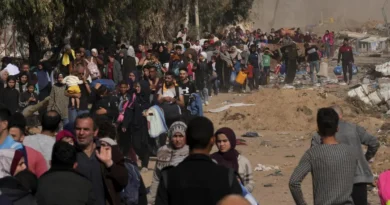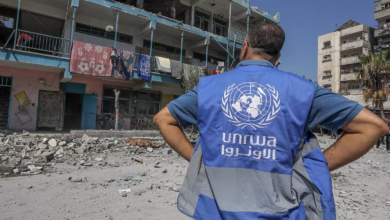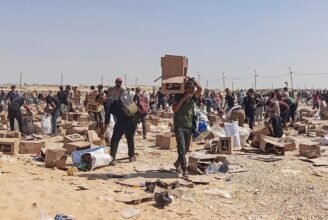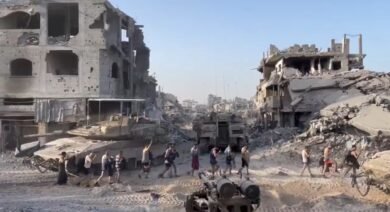
ICSPR: As winter approaches, continued closure of crossings and obstruction of entry of aid and shelter supplies warns of a humanitarian and environmental catastrophe in the Gaza Strip
Tuesday, 4 November 2025
Press Release
ICSPR: As winter approaches, continued closure of crossings and obstruction of entry of aid and shelter supplies warns of a humanitarian and environmental catastrophe in the Gaza Strip
The International Commission to Support Palestinian Rights (ICSPR) warns of the worsening humanitarian catastrophe in the Gaza Strip with the approach of the winter season, amid the continued imposition by the Israeli occupation authorities of severe restrictions on the entry of humanitarian aid, shelter materials, medical supplies, heavy equipment, and reconstruction materials, as well as the prevention of the entry of tents, mobile homes, blankets, and tarpaulin sheets. This situation threatens the lives of hundreds of thousands of displaced people who are living in worn-out tents or partially destroyed homes, with the absence of the minimum requirements for life.
ICSPR stresses that the continued restrictions on the entry of aid constitute a grave violation of international humanitarian law and the Fourth Geneva Convention, and represent a form of collective punishment and slow-motion genocide against civilians, as the aid allowed in by the occupation does not exceed 20 to 30% of the actual needs according to humanitarian organizations’ estimates, at a time when malnutrition levels are increasing among women and children, and the health, environmental, and living conditions are deteriorating in an unprecedented manner.
ICSPR emphasizes that fully establishing the ceasefire agreement and ensuring the opening of crossings without political or security conditions are two fundamental prerequisites to secure the flow of humanitarian and relief aid and gradually restore civilian life in the Strip. This includes the immediate entry of tents, mobile homes, blankets, tarpaulin sheets, and essential supplies to protect civilians from the harsh cold of winter and the heavy rains that threaten to flood camps, shelters, and displacement areas.
ICSPR also warns that preventing the entry of heavy equipment and rescue machinery is paralyzing the work of civil defense crews and service providers, and is obstructing efforts for recovery, repairing service systems, retrieving victims from under the rubble, and dealing with unexploded remnants of war, which increases the risks to civilian lives.
ICSPR calls for intensified UN and international efforts to provide urgent support for early recovery operations for essential public service sectors, including allowing the entry of equipment for municipalities, reconstruction materials, and spare parts needed to operate water, sanitation, electricity, public hygiene networks, and solid waste removal to avert a full-scale environmental and health collapse with the arrival of winter.
ICSPR holds the occupying authorities fully responsible for any humanitarian or environmental consequences resulting from the ongoing blockade or the prevention of aid entry. It reaffirms that any delay in the entry of shelter and recovery needs constitutes a direct threat to civilian lives and undermines prospects for humanitarian stability in the Strip. Accordingly, ICSPR calls for urgent international action in accordance with Common Article (1) of the Geneva Conventions to ensure respect for international law and to put an end to the ongoing humanitarian suffering in the Gaza Strip, and therefore calls upon the United Nations, international relief agencies, the European Union, and the League of Arab States to assume their legal and humanitarian responsibilities and to act urgently to:
-
Consolidate the ceasefire, ensure its full respect, and prevent further violations by the Israeli occupation.
-
Pressure for the permanent opening of all humanitarian crossings without obstacles, and the immediate entry of humanitarian, medical, and shelter aid, including tents, mobile homes, blankets, tarpaulin sheets, and all essential supplies for the population of the Strip.
-
Enable the entry of heavy equipment for civil defense and municipalities, and ensure the delivery of fuel, machinery, generators, spare parts, construction materials, and reconstruction needs to enhance the resilience of civilians and launch a sustainable recovery process.





